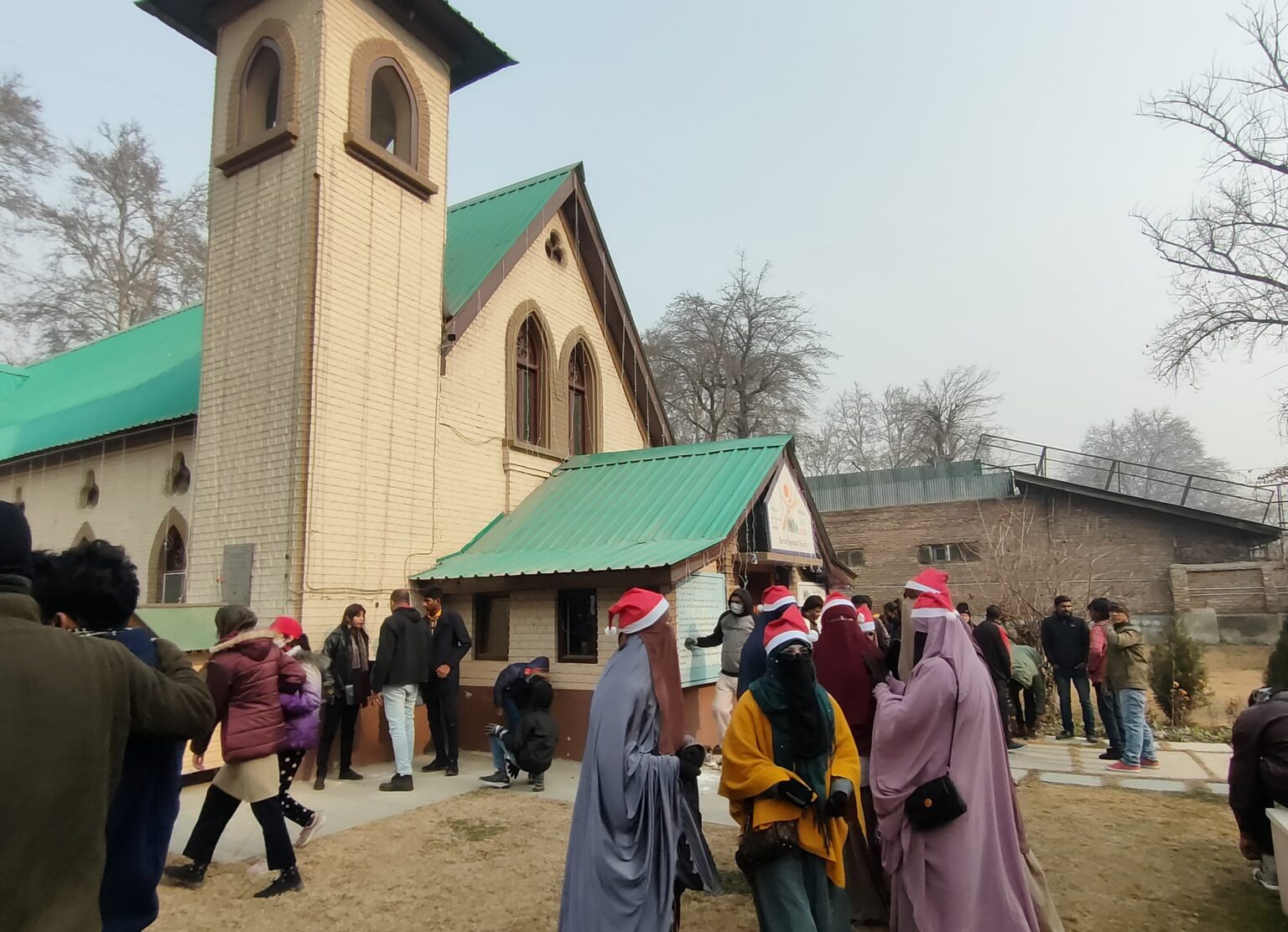Celebrating each other’s festivals is celebrating life.
Farooq Shah
On December 25, a church located at the centre of Srinagar city was bustling with Christmas celebrations. Many young Muslim men and women – some sporting beard in an Islamic fashion and some wearing hijab – were seen wishing their Christian friends a Merry Christmas.
Joyful pictures that epitomized communal harmony went viral but some local clerics disapproved of the act and issued a fatwa ordering the Muslim men and women to pronounce the kalima shahadah afresh because, according to them, they ceased to be Muslims after taking part in Christmas celebrations. This went viral on social media and many others joined the chorus denouncing the men and women for visiting the church which the hardline clergy views as incompatible with Islam.
Their argument is that, even though Prophet Jesus is respected in Islam, Christians refer to him as the son of God, which challenges the Quranic injunction that Allah cannot have children as revealed in Surah Ahad and further supported in Surah Maryam, where it is written that Christians have made an outrageous claim by declaring that Jesus is the offspring of Allah, since having children does not comport with the grandeur of the Most Compassionate.
The hardline clergy, such as the controversial televangelist Zakir Naik, contends that wishing Christians Merry Christmas validates their claim that the Prophet Jesus is the son of Allah.
A sizable section of the Muslims who believe that wishing Christians Merry Christmas is a sinful act that should be avoided at all costs are a significant source of support for this stance. This is the reason the young men and women, who had gone to wish their Christian friends a Merry Christmas, were treated contemptuously.
Disregarding the extreme stance, a large number of Muslims, however, have no issues whatsoever in wishing their non-Muslim friends and colleagues on their festivals. Even some moderate Islamic scholars, like Javed Ghamidi, do not see any problems in wishing Christians on Christmas.
The first and foremost relationship between human beings is their shared humanity, says Ghamidi, a reputable cleric with 1,52,700 Twitter followers as opposed to the hardliner Zakir Naik’s 56,700.
“We are all sons of Adam and Eve,” says Ghamidi in a YouTube discussion on whether or not Muslims should greet non-Muslims on their festivals. “Nobody has a right to spread hatred in the name of religion,” he says.
Ghamidi continues by stating that it is the duty of the community members to maintain and actively engage in the traditions of the group in which they live. He says that it is not difficult for a Muslim to take part in non-Muslim celebrations like Christmas without associating partners with Allah.
While Muslims throughout the world will continue to debate whether or not to attend non-Muslim celebrations, one thing is certain: the degree of tolerance and the sense of inclusivity are the areas that will always require improvement.
Not only do some Muslims exhibit this inappropriate conduct, but some Hindus also have the same beliefs against taking part in Christian celebrations. A group of Bajran Dal members on Christmas set fire to the effigies of the mythical figure, Santa Claus, shouting Santa Claus Murdabad – death to Santa Claus.
“Santa Claus does not provide gifts; his sole purpose is to convert Hindus to Christianity. It’s no longer going to work. Any effort at conversion will be rejected outright. If this does not stop, there will be riots in missionary schools,” Ajju Chauhan, general secretary of the Antarrashtriya Hindu Parishad and the Rashtriya Bajrang Dal, while accusing missionary schools of converting youngsters, said.
As opposed to this, the West does better when considering religious tolerance. For instance, most Western countries are more tolerant than those in the East and have happily enabled Islam to proliferate. The number of people identifying themselves as Muslim in the UK has grown by almost 70 per cent in 10 years, from 1.6 million in 2001 to 3.9 million in 2022. Islam has found a home in the UK.
With the rise in the population of Muslims in Europe, empty churches are being converted into mosques at a rapid rate. According to a news report, some 500 churches in the United Kingdom alone are being converted into mosques. Many churches have officially been converted into mosques by the authorities in London. A number of iconic and historical churches are now mosques where people are attending prayers five times a day.
In post-Christian Europe, Islam is the religion that is expanding the fastest, as suggested by the abundance of mosques constructed in old churches. In many regions of Europe, including not just major urban areas but also smaller towns and cities throughout the continent, there are currently more Muslims who practise their religion than Christians who practise theirs.
Similarly, the number of Hindu temples in the United Kingdom has considerably gone up.
There is ample evidence to suggest that the West does not object to the spread of either Islam or Hinduism on its soil, despite the fact that it has the power to simply cease Muslim and Hindu activity while invoking the same arguments that extremists in our part of the world put forth.
Hundreds of churches have been targeted by extremist Muslims in different parts of the world including Nigeria and Pakistan. Similarly, attacks on churches in India by Hindu radicals are witnessed from time to time.
The refusal of some Muslims and Hindus to participate in Christian festivals is clearly due to a lack of understanding of the fact that festivals are occasions for us to deepen our commitment to inter-faith harmony and rekindle the promise of humanity in our hearts—a promise we frequently lose sight of.
Farooq Shah is a Srinagar-based senior journalist.
